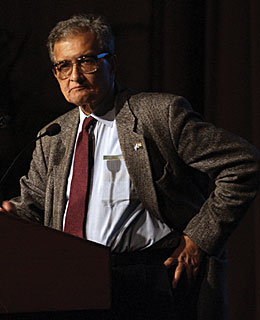
Amartya Sen
It's probably just that Amartya Sen is known primarily for his work exploring the relationship between democracy and poverty, as India has plenty of both. His contention that personal freedoms and economic growth are intimately linked — in his words, that "no substantial famine has ever occurred in any independent and democratic country with a relatively free press" — has been hugely influential. But the Nobel Prize-winning economist's insights into social economics have transformed not just his own country but the world. In 1981, his revolutionary book Poverty and Famines set out to prove that famines stem from faulty food distribution systems, not an inability to grow or purchase food — radically changing popular understandings of how such tragedies occur. Along with Pakistani economist Mahbub ul Haq, Sen in 1990 created the Human Development Index, the world's most widely used barometer for measuring social welfare. Now, at 73, Sen teaches at Harvard, serves as honorary president of Oxfam, and still writes books like 2005's The Argumentative Indian, aimed at helping the wider world understand Indian history and society.
—By Benjamin Siegel